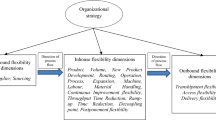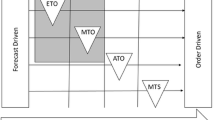Abstract
This paper presents an empirical study of how consumer electronics companies in Brazil deal with the issue of manufacturing flexibility. The main purpose is to provide an understanding into how flexibility is being perceived and utilized in a newly industrialized country. It begins by explaining the relevance of this study. The participation of Brazil in the world economy is important. Here, companies can be very flexible, based on low cost and an abundant skilled work force, yet flexibility has not been addressed. The paper explains how indicators were established to obtain an analytical structure with which to assess the managerial perception and the actual industrial use of flexibility. Finally, we show the most relevant results of our investigation of 16 leading firms in Brazil, including multinational ones. The findings are divided according to managerial perception of flexibility and effective utilization of flexibility in the organization. The paper concludes that firms in the consumer electronics industry in Brazil do not use flexibility practices in the same proportion that they perceive its importance.
Similar content being viewed by others
References
Abernathy, W., The Productivity Dilemma: Roadblock to Innovation in the Automobile Industry, John Hopkins University Press, Baltimore, MD (1977).
Bessant, John, Managing Advanced Manufacturing Technology: The Challenge of the FifthWave, NCC Blackwell Ltd., Oxford, U.K. (1991).
Browne, J., Dubois, D., Rathmill, K., Sethi, Suresh, P., and Stecke, Kathryn E., “Classification of Flexible Manufacturing Systems,” The FMS Magazine, pp.114–117 (April 1984).
Buzacott, J.A., “The Fundamental Principles of Flexibility in Manufacturing Systems,” Proceedings of the First International Conference on Flexible Manufacturing Systems, Brighton, U.K., pp.23–30 (1982).
de Groote, Xavier, “The Flexibility of Production Processes:AGeneral Framework,” Management Science,Vol.40, No.7, pp.933–945 (1994).
De Meyer, Arnoud, Nakane, J., Miller, J.G., and Ferdows, K., “Flexibility: the Next Competitive Battle, the Manufacturing Futures Survey,” Strategic Management Journal, Vol.10, pp.135–144 (1989).
Ettlie, John E.and Penner-Hahn, Joan D., “Flexibility Ratios and Manufacturing Strategy,” Management Science, Vol.40, No.11, pp.1444–1453 (November 1994).
Ettlie, John E.and Stoll, Henry W., Managing the Design-Manufacturing Process, McGraw-Hill Inc., New York (1990).
Garrett, S.E., “Strategy First: A Case in FMS Justification.” In Proceedings of the Second ORSA/TIMS Conference on Flexible Manufacturing Systems (Ann Arbor, MI), K.E. Stecke and R. Suri (Eds.), Elsevier Science Publishers B.V., Amsterdam, The Netherlands, pp.17–30 (August 1986).
Gerwin, Donald, “An Agenda for Research on the Flexibility of Manufacturing Processes,” International Journal of Operations and Production Management, Vol.7, No.1, pp.38–49 (1987).
Gupta, Yash P.and Goyal, Sameer, “Flexibility of Manufacturing Systems: Concepts and Measurements,” European Journal of Operational Research, Vol.43, pp.119–135 (1989).
Gustavsson, S.O., “Flexibility and Productivity in Complex Production Processes,” International Journal of Production Research, Vol.22, No.5, pp.801–808 (1984).
Isenhour, David L., “Design Influences on Manufacturing Flexibility in the Printed Circuit Board Industry,” Masters thesis, MIT, Cambridge, MA (June 1992).
Jaikumar, Ramchandran, “Postindustrial Manufacturing,” Harvard Business Review, pp.69–76 (November- December 1986).
Karlsson, C.and Carlsson, M., “Next Practice in Product Development,” International Motor Vehicle Program Policy Forum, MIT, Center for Technology, Policy and Industrial Development, Cambridge, MA (1989).
Maddison, Angus, Monitoring the World Economy 1820-1992, Centre de Devélopment de L'Organization de la Coopération et de Development Economiques, Paris (1995).
Magaziner, Ira and Patinkin, M, The Silent War, Random House, New York, NY (1989).
Mansfield, Edwin, “The Diffusion of Flexible Manufacturing Systems in Japan, Europe and the United States,” Management Science, Vol.39, No.2, pp.149–159 (February 1993).
Ranta, J.and A. Albian, “Interactive Analysis of FMS Productivity and Flexibility,”Working Paper 88-098, IIASA, A-2361 Laxenburg, Austria (1988).
Rehder, R.R., “Is Saturn Competitive?” Business Horizons, pp.7–15 (March-April 1994).
Sethi, Andrea Krasa and Sethi, Suresh Pal, “Flexibility in Manufacturing: A Survey,” The International Journal of Flexible Manufacturing Systems, Vol.2, No.4, pp.289–328 (July 1990).
Slack, Nigel, “Flexibility of Manufacturing Systems,” International Journal of Operations and Production Management, Vol.7, No.4, pp.35–45 (1987).
Stecke, Kathryn E., “Algorithms for Efficient Planning and Operation of a Particular FMS,” International Journal of Flexible Manufacturing Systems, Vol.1, No.4, pp.287–324 (September 1989).
Stecke, Kathryn E., “Procedures to Determine Part Mix Ratios for Independent Demands in Flexible Manufacturing Systems,” IEEE Transactions on Engineering Management, Vol.EM-39, No.4, pp.359–369 (November 1992).
Stecke, Kathryn E.and Raman, Narayan, “FMS Planning Decisions, Operating Flexibilities, and System Performance,” IEEE Transactions on Engineering Management, Vol.EM-42, No.8, pp.12–16 (August 1995).
Suarez, Fernando F., Cusumano, Michael A., and Fine, Charles F., “An Empirical Study of Manufacturing Flexibility in Printed Circuit Board Assembly,” Operations Research, Vol.44, No.1, pp.223–240 (January-February 1996).
Tan, Gek W., Hayes, Caroline C., and Shaw, Michael, “An Intelligent-Agent Framework for Concurrent Product Design and Planning,” IEEE Transactions on Engineering Management,Vol.EM-43, No.3, pp.297–306 (1996).
Tidd, Joseph, Flexible Manufacturing Technologies and International Competitiveness, Pinter Publishers, London, U.K. (1991).
Tsourveloudis, Nikis C.and Phillis, Yannis, A, “Fuzzy Assessment of Machine Flexibility,” IEEE Transactions on Engineering Management, Vol.EM-45, No.1, pp.78–87 (1998).
Upton, David M., “The Management of Manufacturing Flexibility,” California Management Review, pp.72–89 (Winter 1994).
Upton, David M., “What Really Makes Factories Flexible?” Harvard Business Review, pp.74–84 (July-August 1995).
Womack, J.P., Jones, D.T., and Roos, D., The Machine That Changed the World, Macmillan Publishing Company, New York, NY (1990).
Woodruff, David, “A Dozen Motor Factories Under One Roof,” Business Week, pp.90–94 (November 20, 1989).
Xavier, Guilherme.G., “Investigating Flexibility and Information Technology as Key Elements for Competitive Advantage,” Produção, Vol.7, No.2, pp.159–175 (1997).
Zelenovic, D.M., “Flexibility– a Condition for Effective Production Systems,” International Journal of Production Research, Vol.20, No.3, pp.319–337 (1982).
Zukin, Marcio and Dalcol, Paulo R.T, “Visão Gerencial sobre a Importância da Flexibilidade em Respostaàs Incertezas” [Managerial Viewpoint about the Importance of Flexibility in Reply to the Uncertainties, in Portuguese], Proceedings of the 21st Meeting of Associação Nacional dos Programas de Pós-Graduação em Administração, Angra dos Reis, Rio de Janeiro (1997).
Author information
Authors and Affiliations
Rights and permissions
About this article
Cite this article
Zukin, M., Dalcol, P.R.T. Manufacturing Flexibility: Assessing Managerial Perception and Utilization. International Journal of Flexible Manufacturing Systems 12, 5–23 (2000). https://doi.org/10.1023/A:1008100514668
Issue Date:
DOI: https://doi.org/10.1023/A:1008100514668




